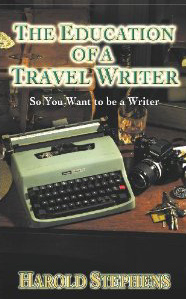 Among veteran travelers, there probably aren’t too many of us who haven’t, at least for one small moment, entertained the possibility of being travel writers. It’s tempting. We see lots worthy of writing about, and many of us keep notes, in notebooks, in the back of travel guides, or in electronic devices we carry with us. It’s the fodder for seemingly millions of blogs. Veteran travel and adventurer writer Harold Stephens taps into this yearning with his fascinating and well-written The Education of a Travel Writer: So You Want to Be a Writer (2009, ISBN: 0-9786951-2-7).
Among veteran travelers, there probably aren’t too many of us who haven’t, at least for one small moment, entertained the possibility of being travel writers. It’s tempting. We see lots worthy of writing about, and many of us keep notes, in notebooks, in the back of travel guides, or in electronic devices we carry with us. It’s the fodder for seemingly millions of blogs. Veteran travel and adventurer writer Harold Stephens taps into this yearning with his fascinating and well-written The Education of a Travel Writer: So You Want to Be a Writer (2009, ISBN: 0-9786951-2-7).
Stephens is a compelling storyteller whose books are engaging. He knows what he’s talking about, and doesn’t gloss over anything. Two important elements in the book are his emphasis on doing the right amount historical research to frame the writing, and the fact that a writer must always be writing, compulsively. Another interesting aspect is how he combats writing fatigue by writing several stories simultaneously.
Of the many fascinating passages in the book, here are two:
I find myself a writer twenty-four hours a day, even when I am sleeping. I wake in the middle of the night with new plots racing around in my head. Sometimes I have to get up and write them down. If I don’t, the next morning I am angry with myself. I can’t remember what they were. How could I let them go? They were brilliant. When I am riding in a car, walking down the street, sitting in a barber chair, my mind is not my own. I am writing. I find 1 have to describe the world around me in words, the expression on that woman’s face sitting across from me on the bus. The conversation I hear, I try to find words to express the accent, the tone of voice. Then there are the sounds. A train rumbling over tracks. A woman with shoes with wooden heels walking on a hard surface floor. My mind is never my own. As I am always writing, I am always in a daze. How do I capture it all? It becomes a challenge. My mind is constantly at work — sketching, painting, drawing — all day long, all night long, even in my sleep. That is what writing is about.
When it comes to pitfalls, travel writing creates them, and often they are unavoidable. To get published we must adhere to the rules, and that means writing what editors want. The idea of good travel writing, of course, is to promote travel. Fine. But what happens when I am visiting a place I don’t like? My solution is to write about only those places that I like and favor, and then I don’t have to fabricate and write lies. Critics often accuse me of only writing nice things about a destination and it is true. What they don’t know is that I don’t write about those places I dislike.
We think Stephens has a point. It’s much more fun to write about places you love, and travelers never run out of wonderful places. This is a terrific book written by a writer whose written more than thirty books and countless travel magazine articles. Highly recommended. Buy it now at the WoWasis eStore.
Leave a Reply